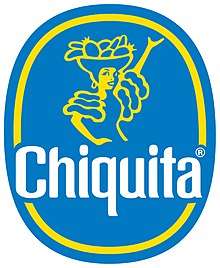United Brands Company v Commission of the European Communities
United Brands v Commission (1976) case 27/76 is an EU competition legal case concerning abuse of a dominant position in a relevant product market. The case involved the infamous "green banana clause". It is one of the most famous cases in European competition law.
| United Brands Company v Commission of the European Communities | |
|---|---|
 | |
| Court | European Court of Justice |
| Keywords | |
| Competition; Abuse of a Dominant Position | |
Background
European Union competition law seeks to ban cartels, collusion and other anti-competitive practices,[1] and to ban abuse of dominant market positions.[2] The primary aim is to prevent any distortion of the single market, rather than to provide individual redress. The particular objectives are to establish:
open, non-partitioned market; effective competition; no over-concentration, fairness, international competitiveness.[3]
Facts
United Brands Company (UBC) was the main supplier of bananas in Europe, using mainly the Chiquita brand. UBC forbade its distributors/ripeners to sell bananas that UBC did not supply. Also, UBC fixed pricing each week; charging a higher price in different Member States, and imposed unfair prices upon customers in Belgo-Luxembourg Economic Union, Denmark, The Netherlands and Germany.[4]
The Commission viewed United Brands' action as a breach of Article 86 of the Treaty of Rome (now Art 102 of the TFEU).[5] Article 86 prohibits "abuse of a dominant position" of a relevant market. The case was referred for a Preliminary Ruling to the European Court of Justice under Article 177 (now Art 267).
Judgment
Agreeing with the Commission, the ECJ held that United Brands' behaviour was unlawful:
- The ECJ rejected UBC's claim that the product market was the "fresh-fruit market as a whole". Instead, because of the notion of cross elasticity of demand and product characteristics, the product market was defined as the banana market.
- UBC had about 45% of the EU banana market, and 45% was deemed to amount to a "dominant position".[6]
- Since the "green banana clause" effectively prevented any competing logistics firms from carrying Chiquita bananas, it was anti-competitive and in breach of Art 86.
See also
- EU competition law
- Consten & Grundig v Commission
References
- Art 101 TFEU
- Art 102 TFEU
- European Union Law: Text Cases & Materials - Tillotson, John
- Case report []
- The relevant articles were originally numbered 85 & 86, then 81 & 82, and finally 101 & 102
- M.A.G. van Meerhaeghe, Protection of competition in Belgium, Economia delle Scelte Pubbliche (Journal of Public Finance and Public Choice), Vol. VIII, 1990-2/3, p. 100.